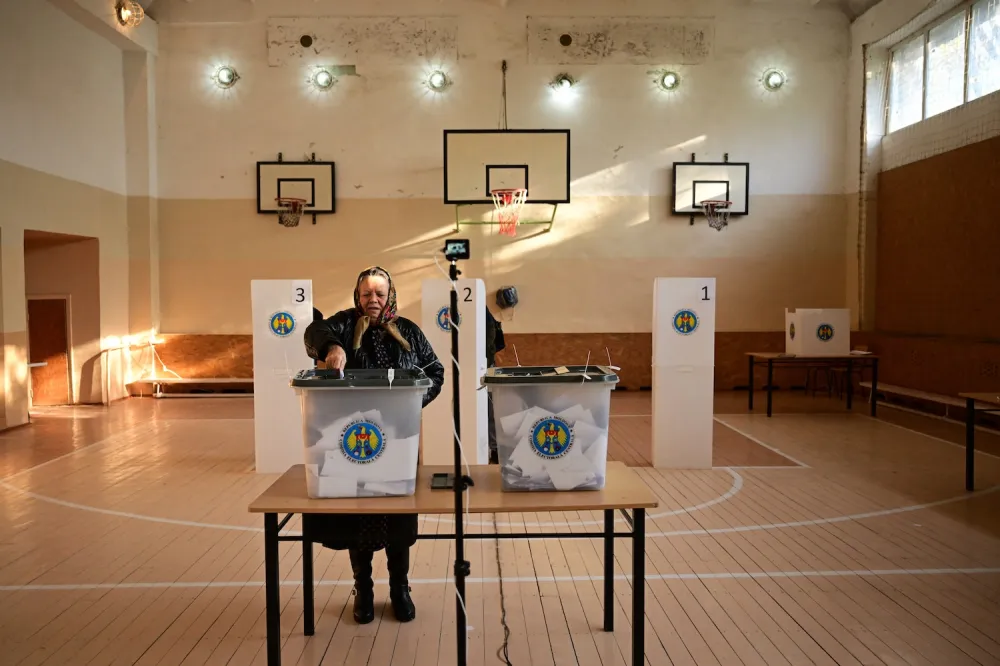The Republic of Moldova, bordered in most directions by Ukraine, is having a parliamentary election this week, and the stakes are existential. In this election, the competition is not between right or left—but between a democratic, European Moldova and Russia.
The phrase “influence operations” is utterly inaccurate to describe what is happening in Moldova. It implies a gentle thumb on the scale, where malign actors spread disinformation and meddle in political narratives to nudge an electoral outcome in a favorable direction. In Moldova, Russia is engaged in a multi-vector war. It aims not only to thwart Moldova’s trajectory toward European Union membership—approved by a narrow majority in a 2024 referendum—and bring it into Russia’s sphere of influence, but also to use the country as a geographically well-situated base to conduct hybrid attacks within the EU and operations in Ukraine.
While in Moldova on a fact-finding mission with the McCain Institute, German Marshall Fund, and European Council on Foreign Relations, European representatives acknowledged the stakes of the upcoming election. As one EU diplomat said to the delegation, “Our objectives here are to ensure that the elections are free and secure and that Moldova continues on the EU path.” EU representatives described their investments in cyber and election security, provision of strategic advice, crisis management training, technical assistance to Moldovan authorities, funding for independent media outlets and civic watchdogs and deployment of long-term and short-term election monitors. EU states are also helping with open-source intelligence analysis to identify patterns of influence, training in strategic communications to preempt Russian disinformation, and creating hybrid response teams in cooperation with the Moldovan government.
Under Chatham House Rules, a U.S. representative told delegation that the United States has “no dog in this fight.” Yet the implications of this election interference are wide-reaching; in addition to Russia’s ambitions for Moldova as a whole, it is also a laboratory for testing Russian war tactics. A security expert told the delegation that Moldova, with Romania on its western border and approximately 35 percent of Moldovans holding Romanian passports, is a Trojan horse through which Russia can infiltrate the EU. (Romanian law allows citizenship for descendants of people who were Romanian citizens.) In addition, Moldova is an excellent base camp from which to launch hybrid tactics on nearby U.S. interests such as a U.S. military base in Romania. And with a pliant Moldova, Russia can encircle Ukraine from the west as well as enhance and mobilize its troop presence in Moldova’s Transnistria to conduct operations in the Ukrainian city of Odesa, a nearby prized target.
Moldova has a long history of living under Russia’s oppressive thumb. In August 1991, Moldova broke free from the Soviet Union, but Russia’s attempts to control the nation have never ceased.
After gaining its independence, Moldova immediately faced separatist movements and unrest from the Gagauz, a Turkic ethnic group, and in the Transnistria region, aided by Russian military forces. Gagauzia was granted local autonomy in 1994 and is currently ruled by its own governor, executive committee, and legislature. The Moldovan Constitution authorized a similar special status for Transnistria, which was rejected by the authorities there, and Transnistrian residents voted for independence in 2006. The international community has not recognized this independent status. Under the Transnistrian Constitution, its president serves as prime minister, and there is a unicameral legislature. Russia still maintains 1,500 troops in the region.
Since its break from the Soviet Union, Moldova has sought closer ties with Europe, starting with the Partnership and Cooperation Agreement that was signed in 1994. In 2014, Moldova signed an Association Agreement with the EU, paving the way for reforms to align Moldova’s economy and policy to EU standards. Russia’s full-scale invasion of Ukraine in 2022 provided further momentum for Moldova to align westward, and the government—led by President Maia Sandu of the Party of Action and Solidarity (PAS)—officially applied for EU membership that same year. Candidate status was granted soon after.
In October 2024, simultaneous with the election in which Sandu won reelection as president, voters backed a constitutional referendum to join the EU by the slimmest of margins, at 50.39 percent.
Despite the referendum’s result, Moldova’s path to the EU is uncertain. In this year’s parliamentary elections, which are set for Sept. 28 and the polls show are neck-and-neck, the issue of the country’s European orientation looms large. Of the four main contenders likely to clear the electoral threshold, the governing PAS is clearly pro-EU. The Patriotic bloc is overtly pro-Russian while two others, according to independent monitors, have links to Russia and emphasize ambiguous themes of “Moldovan sovereignty” and “strategic foreign engagement.” (Those are viewed as code for weaker ties with Brussels.)
Moldovan watchdogs, government officials, and independent media largely agree that Russia’s immediate goals are to prevent a PAS majority, slowing or stopping the European accession process, and creating instability through a weak coalition, which would likely lead to the dissolution of parliament and snap elections. As Nicu Popescu, a former Moldovan foreign minister and current PAS candidate for parliament, told us, “Russia’s immediate goal is not to win but to prevent an EU win. Ultimately, this period of confusion and non-alignment will pave the way for more robust Russian control in the future.”
To achieve this goal, Russia is employing multiple weapons. Information manipulation is key. Almost every stakeholder with whom the delegation met agreed with Sandu that Russian information manipulation is occurring at unprecedented levels. On the widely used Telegram app, Russia has penetrated a growing number of anonymous and local channels. Russia has also set up fake mailbox accounts to overwhelm voters with false emails and texts claiming to be from a ministry or foreign delegation. Local journalists told the delegation that, in one case, a fake message came from the name of the education minister, claiming that schools would have mandatory LGBTQ+ awareness classes.
Russian TV stations remain popular and have successfully dodged legal blocks by infiltrating new domains on browsers or apps. According to several independent media representatives who spoke to the delegation, more than 178 TV channels from Russia are flooding the market. The Moldovan government is struggling to keep up with this “cat and mouse” situation as Russia easily adapts and changes course, utilizing AI and new technological tricks to dodge detection and stay on air.
The Kremlin’s messages are crafted for different target audiences, but the overall narrative is designed to turn Moldovans away from the EU, claiming Moldova will lose its sovereignty, identity, and culture. According to EUvsDisinfo, a project that tracks Russian narratives, messages like “the US and the EU have spent millions of dollars to destroy traditional values in Moldova” and “NATO forcing LGBTIQ+ agenda on Moldova” are prevalent. Another common narrative is that the EU will make Moldova a colony, and it will lose its sovereignty. Many messages directly target Sandu, saying, according to one observer, that she has “no soul” and criticizing her lack of children. One widespread narrative is that Sandu bought sperm from Elton John and Ricky Martin.
Russia and its proxies (local oligarchs, priests, and paid influencers) are also sowing the ground to reject the results of the elections. Central Election Commission chairperson Angelica Caraman said that the widespread information onslaught casting doubt on the integrity of the election process was one of their biggest challenges. She said that candidates were preparing for a result they “don’t like,” describing one video purporting to show an “illegal ballot.” (The ballot shown was from Romania.)
Moldova’s Eastern Orthodox Church, subordinate to the Russian Orthodox Church, also plays a part. This is most problematic because of the continuously high public trust in the church. A senior government official said that Moscow flies priests to trainings abroad, such as in Serbia and Turkey, to help them set up their own Telegram channels and TikTok presence, like the priest Ieremia Cekan.
According to Moldovan officials and independent monitors, Russia is also planning kinetic activities to enhance its sabotage efforts, including arson attacks, protests, false flag operations, and street fights. Elena Marzac, director of Platform for Security and Defense Initiatives, said, that on election day Russia will try to mobilize from Transnistria to carry out such efforts. Election observers and officials acknowledge there is potential for violence.
To pay for these activities, Russia’s financial investments in Moldova continue to increase. Sandu has accused Ilan Shor, a powerful local oligarch who is currently in exile in Moscow, of being an instrument in Russia’s efforts to destabilize Moldova and undermine its pro-European government. Shor has owned media outlets, sports teams, businesses, and he has also been convicted of fraud and money laundering. While several parties have been banned due to their direct links with Russian financing, several have regrouped into new party formations and blocs, often by registering as independent candidates.
Russia has used crypto coins via Kyrgyzstan, such as A7A5, to send wire transfers to multiple bank accounts of parties, operatives, and regular voters, resulting in thousands of transactions each day. Moldovan authorities have identified hundreds of millions of dollars in illegal financing, though Liliana Vitu, head of Moldova’s Audiovisual Council, said this represents only a fraction of the real investment. The United States and EU have implemented some sanctions against Russian-backed operatives as well as cryptocurrencies.
Moldovan leaders, civil society, and independent media are working to strengthen the country’s defenses against Russia, fortifying electoral infrastructure and cybersecurity, shutting down illegal sites and financial transfers, and proactively communicating with voters. For example, the country’s Audiovisual Council closely monitors the media, enforcing broadcast laws, while the Center for Strategic Communication and Combatting Disinformation is working to build tools to measure societal trust and implement programs to build social cohesion and unity. Independent media outlets like Nokta, from Gagauzia, described hosting YouTube channels, podcasts, and daily news updates to provide factual reporting on politics, the economy, and foreign affairs. And the Youth Media Center has used influencers to go on the offensive by promoting digital and offline campaigns on the benefits of joining the EU.
But as Vitu said, the fight to offer truthful information and combat Russian hybrid warfare is “completely asymmetrical. We are bringing a butter knife to a gun fight.” This asymmetry has been made worse by the United States abdicating support at a crucial time.
At a time when the United States should be enhancing investment, the elimination of the United States Agency for International Development (USAID) and estimated cuts to Moldova of more than $150 million have kneecapped critical election observation groups, media efforts, and strategic communication support.
Essential work debunking Russian narratives; providing accurate information on elections, the EU, Ukraine, and the economy; monitoring illicit financing; and bolstering civic resilience has ceased. One media group said that while it still received funding from the U.S. State Department, it was told that the funding couldn’t be used for work countering Russian disinformation. A spokesperson from the U.S. Embassy refused to comment on the record.
USAID canceled $32 million dollars for Internews, which supported independent media and countered disinformation programs, as well as $22 million in funding to support free and fair elections. Organizations like the National Democratic Institute and the International Republican Institute, which were both cut by USAID, deploy monitors and train local election groups. IREX, which provides support to numerous media, civic education, and information integrity initiatives, lost its U.S. funding. Voice of America and Radio Free Europe/Radio Liberty, which provide accurate information in a media environment dominated by Russia, have also been cut.
The United States should instead be drastically increasing its cooperation with the Moldovan intelligence community, bolstering funding and technical assistance for civil society and media, as well as enhancing sanctions against cryptocurrencies, illegal financing schemes, and individuals.
Supporting fragile democracies like Moldova has been part of bipartisan U.S. foreign policy since the end of World War II. Russia’s interest in Moldova goes well beyond the country itself. The United States must be on the right side in an election that is a choice between U.S. interests and Russia. The current administration’s strategy of disengagement and funding cuts is only aiding the wrong side.
The post Russia Isn’t ‘Influencing’ Moldova’s Election appeared first on Foreign Policy.




